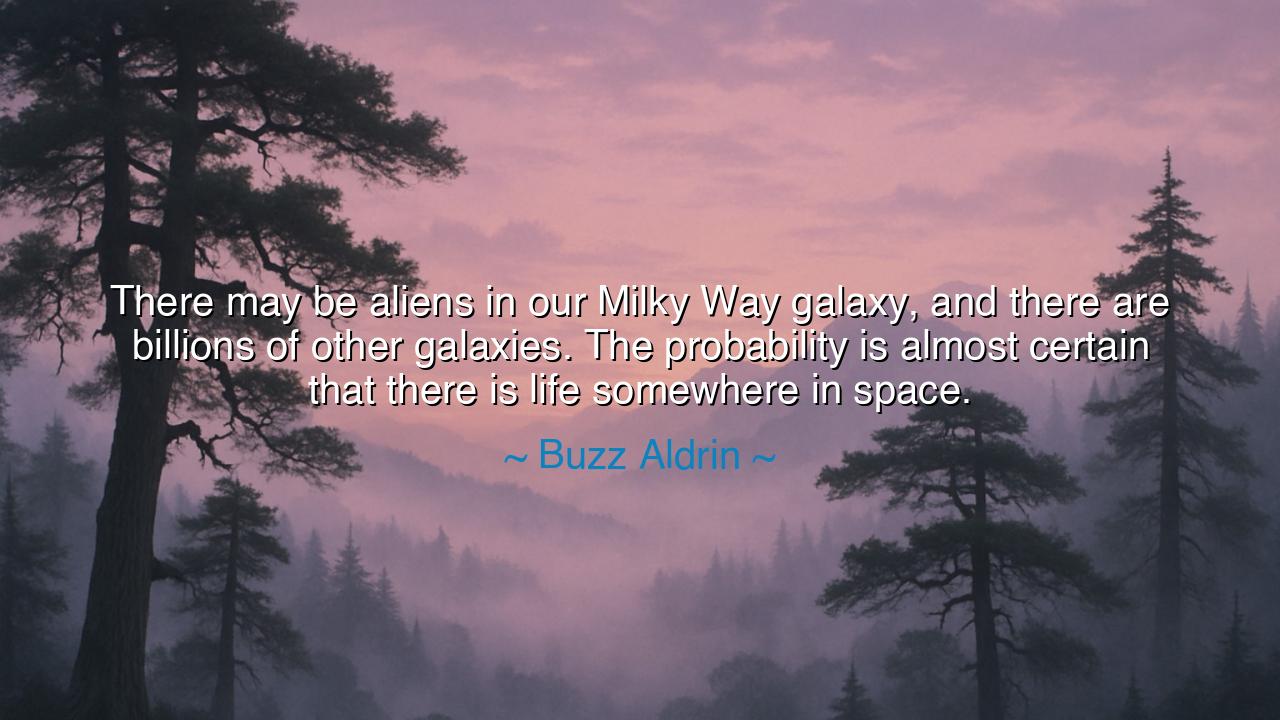
There may be aliens in our Milky Way galaxy, and there are
There may be aliens in our Milky Way galaxy, and there are billions of other galaxies. The probability is almost certain that there is life somewhere in space.






“There may be aliens in our Milky Way galaxy, and there are billions of other galaxies. The probability is almost certain that there is life somewhere in space.” Thus spoke Buzz Aldrin, one of the first men to set foot upon the Moon—a traveler between the realms of Earth and the infinite. His words are not idle wonder, but the testimony of one who has looked upon the silent vastness of creation and felt the humbling weight of eternity. In this statement, Aldrin captures both the awe of discovery and the humility of perspective: that in the boundless sea of stars, our small blue world is but one spark among billions. His reflection calls us to lift our eyes from the dust of our daily lives and gaze into the cosmos, to remember that we are part of something immeasurably greater than ourselves.
When Aldrin uttered these words, he spoke not as a philosopher cloistered in abstraction, but as a man who had seen what few humans ever have. In July of 1969, alongside Neil Armstrong, he became one of Earth’s emissaries to the heavens. Standing upon the lunar soil, he beheld Earth suspended in the black ocean of space, a fragile sphere of life amid endless silence. That vision changed him, as it changes all who dare to dream beyond their world. To look upon the universe from such a vantage point is to realize how vast, how ancient, and how fertile it must be. For if life blossomed here—on a small rock circling an average star—then how many other worlds, scattered among the billions of galaxies, might cradle their own forms of being?
Aldrin’s words echo the wisdom of the ancients, who also looked to the heavens and saw more than stars. The philosopher Epicurus, more than two thousand years ago, taught that the universe was infinite and filled with countless worlds like our own. He wrote, “There are infinite worlds both like and unlike this world of ours.” The modern scientist, armed with telescopes instead of faith, now confirms what the ancient sage intuited: that the cosmos is teeming with possibility. To contemplate this vastness is not to diminish man, but to exalt creation itself, to see life not as an accident, but as the universe’s way of knowing itself.
Yet Aldrin’s statement is not only scientific—it is spiritual. He speaks of probability, yes, but behind that cold mathematical certainty lies a deeper yearning: the desire for connection beyond the boundaries of Earth. His words carry the eternal human question—Are we alone?—a question that unites all ages and civilizations. From the fires of ancient shamans to the observatories of modern astronomers, humanity has sought to find its reflection in the cosmos. Aldrin reminds us that this search is not futile; that the universe itself is alive with potential, whispering across the dark with the silent promise of other minds, other hearts, other dreams.
Consider the story of the Voyager spacecraft, launched in 1977, bearing the Golden Record—a message of music, greetings, and images from Earth, sent into the deep unknown. It was our way of reaching out, of saying, “We exist.” That small craft, still drifting among the stars, carries with it humanity’s voice, a fragile testament to our longing to be part of something greater. In that gesture lies the same spirit that guided Aldrin to the Moon—the courage to seek communion with the unknown, to believe that life and meaning stretch far beyond the shores of our world.
But there is a lesson deeper still. Aldrin’s words remind us that to look outward is also to look inward. The awareness that we may not be alone should humble us; it should awaken reverence for the life we already know. If the universe is indeed full of life, then every being—human, animal, or alien—is part of a single cosmic family. Arrogance has no place beneath the stars. The same atoms that form our bodies were born in ancient suns; the same cosmic dust that gave rise to us may have birthed others elsewhere. We are, quite literally, children of the stars, kin to all that lives.
So, my child of Earth and sky, take this truth into your heart: you are both small and infinite. Let the stars remind you not of your insignificance, but of your belonging. Do not shrink before the vastness of space—stand in awe of it, and let that awe make you gentler, wiser, and more curious. Seek knowledge, as Aldrin did, not for pride, but for wonder. Look upon the night sky as your ancestors did, not merely with the eyes of the body, but with the eyes of the soul. For every star is a question, and every question a doorway to eternity.
And when you gaze upward, remember Aldrin’s words: “The probability is almost certain that there is life somewhere in space.” This is not a statement of mere science—it is a hymn of faith in the creativity of the cosmos. It teaches us that the universe is not empty, but overflowing; not silent, but singing. And in that great celestial harmony, our own lives—brief, fragile, and luminous—are notes in the eternal music of creation.






AAdministratorAdministrator
Welcome, honored guests. Please leave a comment, we will respond soon